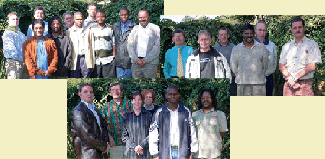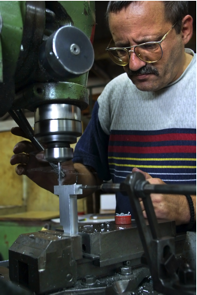Welcome to Terotechnica Maintenance College

Dr Jasper L. Coetzee
Welcome by the Principal of Terotechnica Maintenance College
"I hereby wish to extend a heartiest welcome to maintenance practitioners and would be practitioners to our world of imparting Asset Management / Maintenance knowledge to others. We have, as our M-Tech website states, a passion for maintenance, maintenance people, and their empowerment to practice maintenance excellently. Enjoy your study into the new and old realities of the battle against failure, and then go and 'just do it'."
Also see our philosophy
| Additional information: | |
Our Philosophy about Asset Management / Maintenance
Maintenance success elements
To understand our philosophy regarding maintenance training, it is essential to understand what we regard to be the important elements ensuring maintenance business success, which are shown in the picture on the right of the page.
 The following seven elements, which are shown in the figure, should be well developed for a maiontenance organisation to serve the industrial business well:
The following seven elements, which are shown in the figure, should be well developed for a maiontenance organisation to serve the industrial business well:
1. A well systemised organisation
2. Proper equipment life-cycle management
3. A good maintenance operational system
4. The implementation of the correct level of maintenance technology
5. A 'deep' level of maintenance expertise (at all levels of maintenance operations and management)
6. Well designed maintenance logistics
7. A high level of development of personnel
If all these are in place, the maintenance function will support the organisation well in achieving its production and income goals.
Also visit our Qualifications Offered page for more detail regarding the 7 points listed above.
We believe that Maintenance Engineering is moving towards being an own Engineering Discipline in its own right, both at undergraduate and graduate levels.
The diploma and other courses that we present are a necessary stepping stone in that direction.
As a part of the logical outflow from this philosophy, our Managing Director is also involved in postgraduate tuition and research at the University of Pretoria.
| Centre for Asset Integrity Management | Additional information: | |
In house courses
Save with in-house courses
Some organisations find it beneficial to bring us to the students, instead of the students to us. The travel and subsistence is certainly cheaper for one or two lecturers than for a whole group of your people, and there is an attractive discount for in-house courses with more than 10 students.
At some occasions organisations have even endeavoured to arrange a local group course, where they arrange a quasi-public course with students from other organisations in their city/town also attending.
 We require a minimum of five students for an in house course.
We require a minimum of five students for an in house course.
The cost per student for in-house courses with between 5 and 10 students the same as the advertised rate for our public courses in Pretoria. To this is added the cost of travel and subsistence for our lecturer(s).
Above ten students a discount of 20% applies on the advertised rate for our public courses in Pretoria (the cost of the travel and subsistence of our lecturer(s) will still apply).
Please contact our Registrar for a booking.
Telephone (016) 932 1629 or (012) 548 6096 or 082 855 8016
E-mail: This email address is being protected from spambots. You need JavaScript enabled to view it.
Please Note: Conditions of Entry and Payment Terms on the Administration page.
International Students
Rules for international study
Where international students (typically from other African countries) attend our public courses, the same prices/conditions naturally apply that is applicable to South African students. We may however in some cases strictly require up front payment.
Where international students wish to do coursework on a distance study basis, the same rules as that for local study applies, apart from mailing cost which will be determined on a case by case basis. To allow for international currency fluctuations, the cost of courses in such cases will be charged in US Dollars:
- Two day course $ 600
- Three day course $ 900
- Four day course $ 1200
- Five day course $ 1500
- Diploma $ 6000
The mail cost will be determined an a case by case basis. See the contact details of our course administrator below.
In the case of international in house courses, the conditions on our In house courses page apply. Prices may be escalated to allow for extra travel time and inconvenience to lecturers.
Please contact our Registrar for a booking/quotation.
Telephone +27 16 932 1629 or +27 12 548 6096 or +27 82 855 8016
E-mail: This email address is being protected from spambots. You need JavaScript enabled to view it.
Please Note: Conditions of Entry and Payment Terms in the Administration page.
| Additional information: | |
C101: Asset Management for Artisans
This course intends to assist artisans in getting into a habit of first thinking before acting
The maintenance artisan is the direct executional arm of the Asset Management / Maintenance department. But not only that; this person is also the one who has to perform the direct liaison with the production operator/miner, has to do the final planning, and has to think through the exact method of performing the task at hand. He/she thus not only needs to be trained well technically, but must also understand the principles involved in maintaining equipment proactively and manage him-/herself well.

Artisan training typically teaches artisans how to perform the tasks of the specific Trade - and that is correct. However, artisans need specific training regarding their role in the Asset Management / Maintenance world.
- Firstly, some maintenance-critical knowledge is missing from the 'toolbox' of the typical artisan.
- Secondly, the typical artisan is not equipped with the personal planning and management skills to manage maintenance situations effectively.
- Thirdly, maintenance artisans have a wrong attitude towards paperwork, which is very detrimental to the maintenance outcome.
- Fourthly, maintenance artisans tend to lack activity potential due to motivational problems and not having the 'tools' to get more from other people, such as their production counterparts.
This course is aimed at putting the maintenance function in perspective for the artisan, provide the necessary skills, emphasize good relations with the production function, underline the importance of proper communication, and promote a proactive and positive attitude.
Course Content
|
Day 1 – General Maintenance Principles
|
|
Day 2 – Involvement and Techniques
|
Appendices The course material include
|
|
Who should attend
The course is intended for maintenance artisans and those who manage them.
The reason for including the wording 'those who manages them' in the sentence above is that we often find that some class of Asset Management / Maintenance people are sent on courses without the person managing them being able to activate their newly acquired knowledge after the course. What rather happens is that they are managed exactly in the same way as before the course, which often leads to the course not having the required effect.
|
|
|
Credits 4*, level 4** * The course comprises 20 hours of study of which 16 hours are in class, with a further 4 hours of private study. **Occupational Certificate level. |
|
|
Ball and Roller Bearing Maintenance
Comprehensive Courses
Comprehensive courses are for those who are serious about achieving full examined competence in a specific study area
Our comprehensive courses could be seen as fitting in a six by four matrix:

The six columns represent six topical areas, while the rows represent depth of learning in a topical area. The ten courses are:
- C101: Asset Management for Artisans
- C201: Asset Management for Maintenance Supervisors
- C301: Maintenance Planning (there is also a reduced content C301X course for those who want less)
- C302: Advanced Maintenance Planning
- C501: Maintenance Shutdown and Project Management
- C702: Reliability Engineering in Asset Management
- C901: Maintenance Practice for Asset Management Engineers
- C902: Leadership in Asset Management
- C903: RCM Facilitation and Analysis
- C904: RCM ProAktiv: Advanced Reliability Centred Maintenance
To get more information regarding a specific course, simply click on the appropriate link above.
For those who want less rigorously examined knowledge, short courses are the answer. Also consider Diploma Study.





